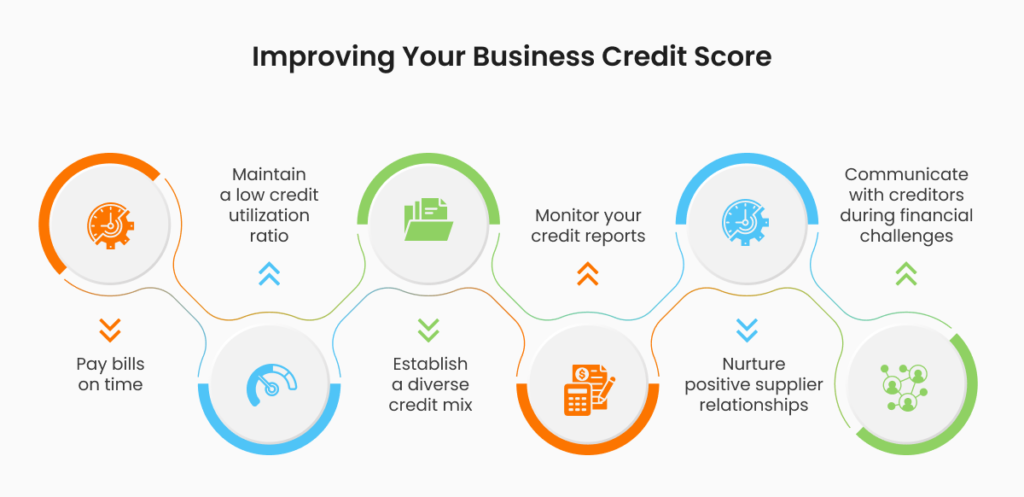As a business owner, managing your financial health is key to ensuring growth and longevity. One of the most significant factors influencing the financial success of your business is your business credit score. Whether you’re looking to secure funding, negotiate better terms with suppliers, or even hire talent, your business credit score plays an integral role in shaping the opportunities available to you.
This article will explore the concept of business credit scores, how they are calculated, and the ways in which they can impact your business. By the end, you will have a comprehensive understanding of how to monitor, manage, and improve your business credit score.
Key Takeaways
- What is a Business Credit Score: A business credit score reflects your company’s creditworthiness, based on factors such as payment history, credit utilization, and outstanding debts.
- Importance: A strong
- Improvement Tips: Pay your bills on time, keep your credit utilization low, and regularly monitor your credit report to ensure accuracy.
What is a Business Credit Score?
Understanding Business Credit Scores
A business credit score is a numerical representation of your company’s creditworthiness. Much like a personal credit score, which reflects an individual’s ability to repay debt, a business credit score assesses how likely a business is to meet its financial obligations. This score is used by lenders, suppliers, and other financial institutions to determine the risk involved in extending credit or providing financing to your business.
Business credit scores are typically calculated using various factors such as payment history, outstanding debts, and the duration of your business operations. The score helps financial institutions determine your ability to repay loans or credit and, ultimately, the terms at which they are willing to lend money to your company.
What Are the Key Factors Affecting a Business Credit Score?
A business credit score is influenced by several key factors:
- Payment History: Just like with personal credit scores, the most significant factor in determining your business credit score is your payment history. Timely payments on loans, credit lines, and trade credit can positively impact your score, while late or missed payments can lower it.
- Credit Utilization: This factor measures the ratio of your current outstanding credit compared to the total available credit. Keeping your credit utilization low is seen as a positive sign by lenders, as it indicates that you’re not overextending yourself financially.
- Length of Credit History: The longer your business has been in operation and using credit responsibly, the better your business credit score will be. A longer credit history provides more data for the credit bureaus to evaluate your repayment habits.
- Outstanding Debts: Lenders also look at your current outstanding debts. Having a high level of debt relative to your revenue or business assets can negatively affect your score, indicating a higher risk of default.
- Public Records: If your business has a history of bankruptcies, judgments, or liens, these will be considered by credit agencies and can have a severe negative impact on your score.
- Type and Size of Credit: The types of credit your business holds (i.e., loans, trade credit, or revolving credit) can also affect your business credit score. The more diverse your credit profile, the more favorable your score can be.
How is a Business Credit Score Different from a Personal Credit Score?
Key Differences Between Business and Personal Credit Scores
While business and personal credit scores serve similar purposes, they are distinctly different:
- Purpose: Personal credit scores assess an individual’s ability to repay personal debt, whereas a business credit score evaluates a company’s ability to manage business debt and finances.
- Factors Used: Personal credit scores are based primarily on individual financial behaviors like credit card payments, debt-to-income ratio, and credit history. Business credit scores, on the other hand, consider business-specific factors like payment history with suppliers, outstanding business loans, and the size of your business operations.
- Scoring Models: Personal credit scores are typically calculated using models like FICO or VantageScore, while business credit scores are calculated using different models such as Dun & Bradstreet (D&B), Experian, and Equifax.
- Impact of the Score: A personal credit score can affect an individual’s ability to qualify for loans or mortgages, while a business credit score is directly tied to a company’s access to business loans, supplier agreements, and favorable interest rates.
Why is a Business Credit Score Important?

The Role of a Business Credit Score in Financial Decisions
A good business credit score can unlock numerous opportunities for your company. Here are the primary ways a business credit score impacts your business:
- Access to Funding: Lenders use your business credit score to assess the risk of lending money to your company. A higher score increases the likelihood of securing loans, lines of credit, or other forms of financing at competitive interest rates. Conversely, a low score can lead to higher interest rates or rejection of your loan applications.
- Negotiating Better Terms with Suppliers: Many suppliers check your business credit score before agreeing to extend trade credit. A higher credit score can result in more favorable payment terms, such as longer payment cycles or lower interest rates.
- Leasing and Rental Agreements: When leasing office space or equipment, landlords and lessors may check your business credit score to evaluate your company’s financial health. A solid business credit score can lead to lower upfront costs and better lease terms.
- Insurance Premiums: Insurers sometimes use your business credit score to determine premiums for business insurance. A lower score can lead to higher insurance premiums, while a higher score can result in discounts.
- Vendor Relationships: Vendors and suppliers may use your business credit score as part of their decision-making process. A strong score can help you build solid, long-term relationships with key business partners.
How to Check Your Business Credit Score
Where to Find Your Business Credit Score
You can check your business credit score through several credit reporting agencies that specialize in business credit. The three major credit bureaus for businesses are:
- Dun & Bradstreet (D&B): Offers the PAYDEX score, which ranges from 0 to 100. The higher the score, the better your business is viewed in terms of creditworthiness.
- Experian Business: Provides a business credit score, which ranges from 1 to 100, with 100 being the best score.
- Equifax Business: Equifax assigns a business credit score ranging from 101 to 992, with a higher score indicating better creditworthiness.
You can request a free business credit report once a year from each of these bureaus, or you can pay for additional reports if needed.
How to Improve Your Business Credit Score
Steps to Boost Your Business Credit Score
Improving your business credit score doesn’t happen overnight, but with the right strategies, you can significantly increase your score over time. Here are some tips:
- Pay Your Bills on Time: Late payments can drastically affect your credit score. Set reminders or automate payments to ensure you never miss a due date.
- Keep Your Credit Utilization Low: Try to keep your outstanding balance under 30% of your total available credit to show that you can manage debt responsibly.
- Diversify Your Credit: Maintaining a variety of credit accounts, including revolving credit and term loans, can improve your credit score by demonstrating your ability to manage different types of credit.
- Monitor Your Credit Report Regularly: Regularly check your business credit report for inaccuracies or fraudulent activities. Dispute any errors you find promptly to prevent them from negatively impacting your score.
- Build Strong Vendor Relationships: Establishing a solid payment history with your suppliers can improve your score. Many vendors report your payment history to credit bureaus, which helps build your credit.
Certainly! Below are more detailed topics related to business credit scores, which could help you deepen your understanding and improve your business’s financial health:
Understanding the Business Credit Report: What You Need to Know
Overview:
A business credit report provides detailed information about your company’s financial behavior. It is a key factor used by lenders, suppliers, and potential partners to assess your business’s creditworthiness.
Details:
- Contents of a Business Credit Report: Includes details on payment history, outstanding debts, legal filings (such as bankruptcies or liens), and credit utilization.
- Sources of Information: The report is compiled by business credit bureaus like Dun & Bradstreet, Experian, and Equifax, and draws information from various sources including vendors, banks, and public records.
- Why You Should Check Your Business Credit Report: Regularly checking your report helps identify any inaccuracies or fraudulent activity. It’s also essential when you are considering applying for credit or entering into contracts with suppliers.
How Business Credit Scores Are Used by Lenders and Creditors

Overview:
Business credit scores are primarily used by lenders and creditors to determine whether or not to extend credit to your company. Understanding how these scores influence lending decisions can help you manage your finances more effectively.
Details:
- Risk Assessment: Lenders use business credit scores to assess the likelihood that a business will repay its debts. A higher score suggests lower risk, while a lower score indicates a higher risk of default.
- Loan Terms and Interest Rates: A good credit score often results in lower interest rates and more favorable terms, while a poor score can lead to higher interest rates or loan rejections.
- How Lenders Determine Credit Limits: The score helps determine not only whether credit is extended but also the amount of credit that can be granted. A strong score may allow for larger credit limits.
The Impact of Business Credit Score on Supplier Relationships
Overview:
Business credit scores not only affect your access to loans but also play a significant role in your relationships with suppliers and vendors. Understanding how your score impacts these relationships can improve your business operations.
Details:
- Trade Credit: Many suppliers and vendors check your business credit score before offering trade credit (the ability to buy goods and pay later). A higher score can result in more favorable terms, such as extended payment periods or discounts.
- Negotiating Better Terms: Suppliers may be willing to offer better terms—such as larger credit limits or longer payment cycles—if your business has a strong credit score.
- Building Trust: A strong business credit score demonstrates that your business is financially responsible, which can foster trust with your suppliers and vendors, leading to more cooperative relationships.
The Role of a Personal Guarantee in Business Credit
Overview:
In many cases, especially for small businesses or startups, lenders require a personal guarantee before extending credit. This means that the business owner’s personal credit score and financial history are considered.
Details:
- What is a Personal Guarantee?: It is a promise from the business owner to repay the business debt with personal assets if the business fails to meet its obligations. This is particularly common in the early stages of a business when the company lacks a solid credit history.
- Impact on Personal Credit: If your business defaults on a loan that is secured by your personal guarantee, your personal credit score will be affected, potentially limiting your ability to access personal credit.
- When Is a Personal Guarantee Required?: Lenders typically require a personal guarantee when lending to new businesses or businesses that have not yet established a strong business credit score.
How a Poor Business Credit Score Affects Your Ability to Obtain Funding
Overview:
A low business credit score can significantly impact your ability to obtain funding, whether through loans, credit lines, or other forms of financing.
Details:
- Higher Interest Rates: If you’re able to secure a loan with a low business credit score, the interest rates will likely be much higher compared to a business with a strong score. This means you’ll pay more over time, which can affect your profitability.
- Loan Rejections: A poor credit score can lead to outright rejections of your loan applications. Lenders may view your business as too risky to lend to.
- Limited Access to Capital: Poor credit may limit your access to lines of credit or short-term loans that could otherwise help smooth cash flow or fund business expansion.
Building Business Credit from Scratch: A Step-by-Step Guide
Overview:
If your business is new or has no credit history, building a strong business credit score from scratch may seem daunting. However, it’s entirely possible with the right strategy and patience.
Details:
- Obtain an Employer Identification Number (EIN): The first step in building business credit is to establish your business as a separate legal entity by obtaining an EIN from the IRS.
- Open a Business Bank Account: Open a business bank account that’s separate from your personal accounts. This will help establish your business as a distinct financial entity.
- Establish Credit with Vendors: Start working with vendors who are willing to extend trade credit and report your payments to business credit bureaus. Make sure to pay your invoices on time to build your credit history.
- Apply for a Business Credit Card: Even if you have to start with a secured credit card, using a business credit card responsibly can help you establish your business credit profile.
How Late Payments Impact Your Business Credit Score
Overview:
Late payments can have a significant negative impact on your business credit score. Understanding how late payments affect your credit can help you avoid mistakes and maintain a healthy score.
Details:
- Severity of Late Payments: The longer your payment is overdue, the greater the impact on your business credit score. A payment that is 30 days late will have less of an impact than a payment that is 90 days late.
- Reported to Credit Bureaus: Vendors and lenders report payment information to credit bureaus, and a history of late payments will be reflected in your credit score.
- Avoiding Late Payments: To avoid late payments, set up automatic payments or create a reminder system to ensure you meet deadlines. Paying bills on time will have a significant positive effect on your score.
How Business Credit Affects Your Business’s Reputation

Overview:
A business credit score not only affects your financial access but also plays a role in shaping your company’s reputation. A strong credit score can enhance your business’s image, while a poor score may harm it.
Details:
- Trust with Stakeholders: A good business credit score can build trust with investors, customers, suppliers, and partners. It signals that your business is financially stable and capable of managing debt.
- Risk Perception: A poor credit score, on the other hand, can make your business appear risky to stakeholders, possibly leading to fewer opportunities, higher costs, and more stringent contract terms.
- Public Perception: Maintaining a strong business credit profile contributes to your reputation as a reliable, responsible company, which can help attract better business deals and partnerships.
The Importance of Managing Business Debt Responsibly
Overview:
Business debt is an important aspect of business finance, but managing it poorly can have disastrous consequences for your credit score and overall business stability.
Details:
- Balancing Debt and Cash Flow: While borrowing can provide essential working capital for growth, it’s important to ensure that your business can manage repayment without putting too much strain on cash flow.
- Monitoring Debt-to-Income Ratio: A high debt-to-income ratio may negatively affect your business credit score and limit future borrowing capacity. Maintaining a manageable level of debt helps ensure financial stability.
- Debt Consolidation: If your business is struggling to manage multiple debts, consolidating them into a single, lower-interest loan may improve cash flow and simplify repayment, leading to a better credit score over time.
How to Handle a Business Credit Score Drop
Overview:
If your business credit score takes a hit, it’s important to act quickly to minimize the damage and recover your score. This topic provides strategies to improve your score if it drops.
Details:
- Identify the Cause: The first step is to understand why your credit score dropped. It could be due to late payments, high debt levels, or an increase in credit utilization.
- Address the Issue: If your score dropped because of missed Payments, bring accounts current and ensure payments are made on time moving forward.
- Build Positive Credit: Over time, paying off existing debt and maintaining a low credit utilization ratio will help your score recover. Consider taking out a small loan or credit line to show your ability to manage credit responsibly.
- Seek Professional Help: If you can’t determine the reason for the drop or need help, consider working with a credit counselor or financial advisor.
Read More :What is a Business Credit Score and How Does It Impact Your Business?
Conclusion
A business credit score is a vital aspect of your company’s financial health. It impacts everything from securing financing to building supplier relationships and even negotiating favorable insurance premiums. Maintaining a good business credit score can significantly improve your chances of success, while a poor score may limit your opportunities and increase costs.
By understanding what factors influence your business credit score and taking proactive steps to improve it, you can position your company for long-term growth and financial stability.
Frequently Asked Questions (FAQs)
1. How long does it take to build a business credit score?
Building a business credit score can take anywhere from six months to a few years, depending on how quickly your business starts using credit and paying off debt.
2. Can I use my personal credit score to get a business loan?
In some cases, lenders may look at your personal credit score, especially if your business is new and lacks a credit history. However, once your business has an established credit score, this will generally take precedence.
3. Can a business credit score affect my personal credit?
While a business credit score is separate from your personal score, if you have personally guaranteed a loan for your business, missed payments could impact your personal credit.
4. Can I improve my business credit score with a secured credit card?
Yes, using a secured business credit card can help you build your credit by allowing you to make regular payments that are reported to the credit bureaus.
5. What is a good business credit score?
A good business credit score typically falls between 80 and 100. This range shows that your business is managing its finances well and is seen as low risk by lenders and suppliers.
6. Does my business need a credit score?
Having a business credit score is not mandatory, but it is highly beneficial if you want to access credit, financing, and favorable terms with suppliers or insurers.
7. Can my business credit score drop quickly?
Yes, your business credit score can drop quickly if you miss payments, incur a large amount of debt, or experience negative public records like a bankruptcy.




